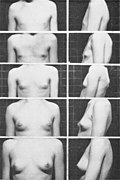Thelarche
Editor-In-Chief: Prab R Tumpati, MD
Obesity, Sleep & Internal medicine
Founder, WikiMD Wellnesspedia &
W8MD medical weight loss NYC and sleep center NYC
Thelarche refers to the commencement of secondary, or postnatal, breast development, typically marking the beginning of puberty in females. Derived from Greek terms, θηλή [tʰelḗ], meaning "nipple", and ἀρχή [arkʰḗ], signifying "beginning or onset", thelarche stands as a pivotal event in a girl's journey towards womanhood.
Definition and Presentation
Thelarche usually manifests as a tender, firm lump situated directly beneath the nipple's center, encompassing the papilla and areola. Colloquially, it's termed a "breast bud" and in medical terminology, it represents the Tanner stage 2 breast development. The preceding Tanner stage 1 describes a wholly undeveloped, prepubertal breast state. The onset of thelarche might be unilateral, affecting one breast before the other, or bilateral, influencing both breasts concurrently.
Physiological Causes and Timeline
- Hormonal Influence: The onset of thelarche is propelled by rising concentrations of estradiol, a form of estrogen.
- Timeline: Thelarche is typically the initial physical transformation of puberty in approximately 60% of girls, commonly occurring post the age of 8.
While breasts developing in varying sizes is a commonplace occurrence, with the left breast being marginally larger in some instances, extreme disparities in size or a complete lack of development in one breast is rarer.
Male Breast Development
Although males may experience breast growth during puberty, termed gynecomastia, the designation "thelarche" is exclusively reserved for female breast development.
Complications and Variations
- Premature Thelarche:
- Isolated Premature Thelarche: Marked by early-onset thelarche without other puberty-associated changes or hormonal effects. This condition requires no intervention.
Age-Based Variations
- Infantile Onset: Commences within the first year and usually resolves by age 2.
- Late Onset: Initiates post 2 years of age, persists longer, and carries an elevated risk of uterine bleeding in the child.
- Precocious Puberty: In instances where thelarche arises unusually early, it might signal the advent of this condition.
Societal Implications and Education
The onset of thelarche, akin to menarche, might catch many girls unprepared, possibly due to societal taboos or deficient education on the subject. Resultant issues can span negative body perceptions, heightened appearance anxiety, diminished self-worth, and delays in detecting breast anomalies. Hence, the incorporation of educational content on breast development in primary and middle schools has been advocated to foster breast health awareness and counter societal stigmas.
See Also
References
| Human physiology of sexual reproduction | ||||||||||
|---|---|---|---|---|---|---|---|---|---|---|
|
Pediatric glossary of terms | Glossary of medical terms | Dictionary of pediatrics
| Health Topics > A | B | C | D | E | F | G | H | I | J | K | L | M | N | O | P | Q | R | S | T | U | V | W | X | Y | Z |
| View All Health Topics in one page! | Health Encyclopedia | Index of health articles |
Professions:Medicine | Nursing | Pharmacy | Healthcare science | Dentistry | Allied health professions | Healthcare
| Medicine | ||||||||||||||||||
|---|---|---|---|---|---|---|---|---|---|---|---|---|---|---|---|---|---|---|
|
Transform your life with W8MD's budget GLP-1 injections from $125.
W8MD offers a medical weight loss program to lose weight in Philadelphia. Our physician-supervised medical weight loss provides:
- Most insurances accepted or discounted self-pay rates. We will obtain insurance prior authorizations if needed.
- Generic GLP1 weight loss injections from $125 for the starting dose.
- Also offer prescription weight loss medications including Phentermine, Qsymia, Diethylpropion, Contrave etc.
NYC weight loss doctor appointments
Start your NYC weight loss journey today at our NYC medical weight loss and Philadelphia medical weight loss clinics.
- Call 718-946-5500 to lose weight in NYC or for medical weight loss in Philadelphia 215-676-2334.
- Tags:NYC medical weight loss, Philadelphia lose weight Zepbound NYC, Budget GLP1 weight loss injections, Wegovy Philadelphia, Wegovy NYC, Philadelphia medical weight loss, Brookly weight loss and Wegovy NYC
|
WikiMD's Wellness Encyclopedia |
| Let Food Be Thy Medicine Medicine Thy Food - Hippocrates |
Medical Disclaimer: WikiMD is not a substitute for professional medical advice. The information on WikiMD is provided as an information resource only, may be incorrect, outdated or misleading, and is not to be used or relied on for any diagnostic or treatment purposes. Please consult your health care provider before making any healthcare decisions or for guidance about a specific medical condition. WikiMD expressly disclaims responsibility, and shall have no liability, for any damages, loss, injury, or liability whatsoever suffered as a result of your reliance on the information contained in this site. By visiting this site you agree to the foregoing terms and conditions, which may from time to time be changed or supplemented by WikiMD. If you do not agree to the foregoing terms and conditions, you should not enter or use this site. See full disclaimer.
Credits:Most images are courtesy of Wikimedia commons, and templates, categories Wikipedia, licensed under CC BY SA or similar.
Contributors: Prab R. Tumpati, MD



